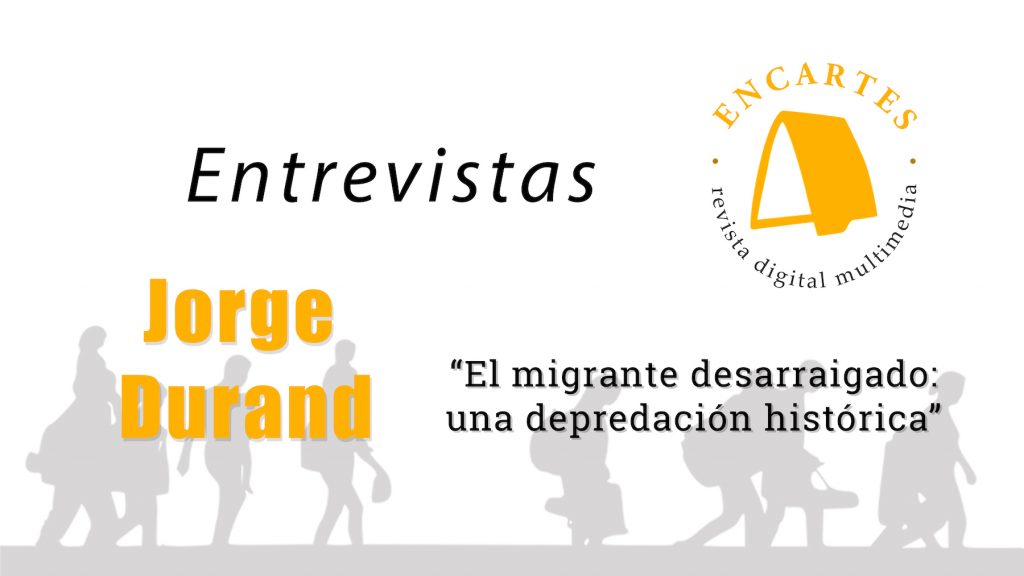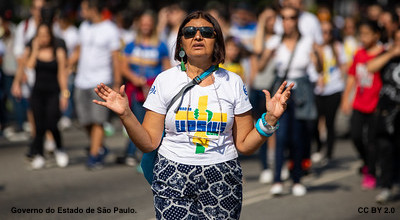home » politics
Articles about "politics"
Entrevistas
Vol 5 No 9 (2022)

The Rootless Migrant: A Historical Depredation
Interview with - Jorge Durand
- Manuela Camus
Jorge Durand is the guest in this interview section of Encartes magazine. Anthropologist and researcher at the University of Guadalajara, where he holds the Chair of Migration, Jorge Durand is a specialist in the United States-Mexico migration dynamics. On this occasion, he describes his incursion into the northern countries of Central America and the new protagonist figure in the region: the uprooted.
Coloquios interdisciplinarios
Vol 3 Num 6 (2020)
Commentary to the colloquium "The Evangelical People: Hegemonic Construction, Minority Disputes and Conservative Reaction" by - Joanildo Burity
― Go to main text
Populism and religion in Brazil and Mexico. A brief reflection
- Nicolas Panotto
Keywords: agonism, evangelical camp, identity, populist logic, politics.
Whe following article seeks to react to Joanildo Burity's study entitled "The evangelical people: hegemonic construction, minority disputes and conservative reaction", which deals with the construction of "evangelical politics" based on the notions of "people" and "populist logic", from the work of Ernesto Laclau. The objective is to highlight the relevance of his contribution in the resignification of some analysis matrixes on the evangelical identity and its relation with the public space. To this end, Burity's proposal will be complemented with the use of other categories within Laclau's own scaffolding, together with the contributions of the production from the Southern Cone regarding the evangelical field.
Coloquios interdisciplinarios
Vol 3 Num 6 (2020)

The evangelical people: hegemonic construction, minority disputes and conservative reaction
- Joanildo Burity
Latin American evangelical politics can be seen, in Laclauian terms, as a construction of the people. More precisely, as the construction of the evangelical people, a minority with demands and a voice of its own in a “Catholic” continent of secular states. It is an evangelical construction of a country’s people in contexts in which evangelicals are considered a sociopolitical force with hegemonic aspirations. However, this double narrative has become complicated in recent years in the rough seas of the so-called conservative wave. A prominent alliance between the political far-right, neoliberalism and the parliamentary and pastoral evangelical elite reverberates from Brazil, which creates serious issues for the expectations of a pluralist impact of the public evangelical presence.
Realidades socioculturales
Vol 3 Num 6 (2020)
Citizen cultures and cultural citizenship. An exploration of the terms
- Jorge E. Aceves Lozano
Keywords: citizenship, culture, rights, globalization, politics.
This text reviews the relationship between citizenship and culture. Exploring social science literature on these terms to analyze particular social subjects, both in their action and their conceptualization, has led us to consider that citizenships are diverse, heterogenous and with unequal positions in regard to other citizens and in their relationship with the sphere of the State. Each group of citizens lives and models its social action based on its own identity configurations, codes and cultural dispositions, all of which are affected by power, gender, class and ethnicity relations. Citizenships express -through their actions, emotions, and thoughts - the social, political, economic and cultural diversity of our contemporary conflictive societies. Two considerations develop in this text: first, the discussion is addressed from citizen practices; a second look highlights the cultural dimension that these practices express about specific citizen rights.
Coloquios interdisciplinarios
Vol 2 Num 4 (2019)
Comment to the colloquium "Inequalities and the re-politicization of the social in Latin America" by - Juan Pablo Pérez Sáinz
― Go to main text
Inequality is always political
- Luis Reygadas
Keywords: social action, social inequality, distribution, power, politics, redistribution.
Whis reflection on Juan Pablo Pérez Sáinz's proposal regarding the consequences and responses of subaltern groups to inequality -which he explores in migration, violence, religiosity and collective action-, appreciates that it places the discussion on social inequality in Latin America back at the center. Reygadas proposes several reflections on the relationship between social actions and inequality. He points out that social disparities are not enough to explain the responses on which Pérez Sáinz focuses. That it is necessary to conceive that the reproduction of persistent inequalities occurs in the long term, while social action has a short-term impact and, in addition, transformations are required in other links of this chain of reproduction. Finally, he qualifies Pérez Sáinz's emphasis on the distribution of basic markets (land, labor and capital), since from Reygadas's perspective, the locus of inequality is also found in redistribution, through progressive fiscal structures, in the economy and politics, markets, society and public institutions, as well as in material distribution and symbolic configurations.






